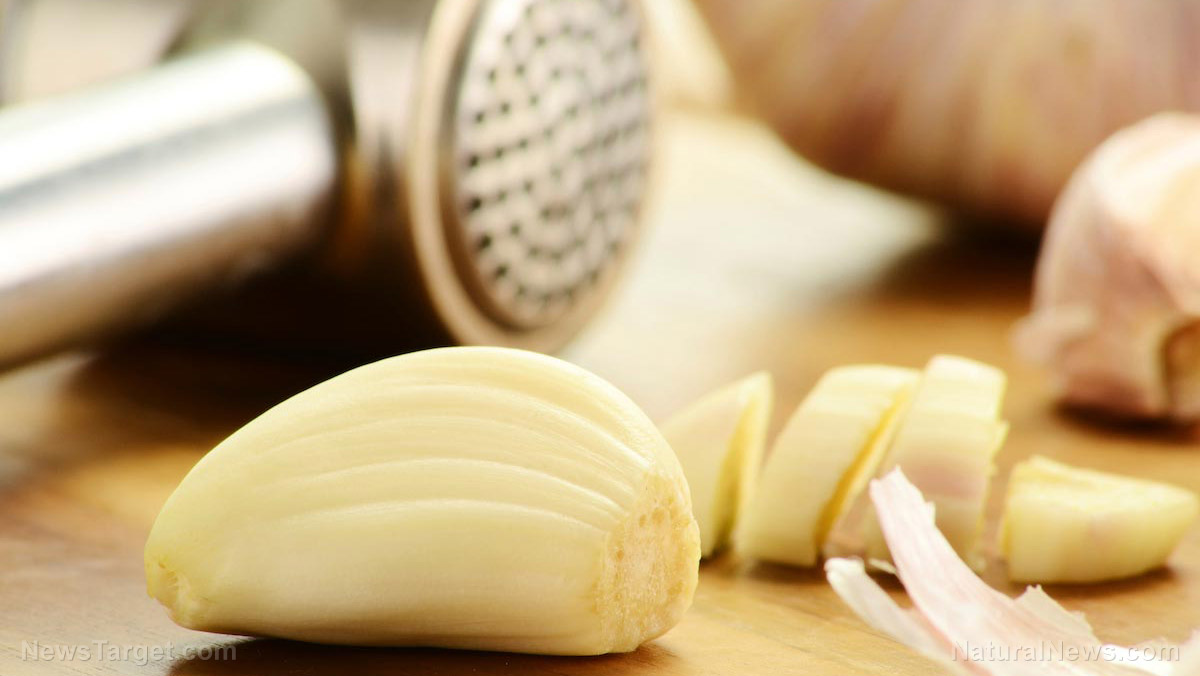Garlic is good for your heart; it lowers your blood pressure
06/13/2018 / By Ralph Flores

Garlic has long been renowned for its antibacterial effects; however, several studies have shown that it could also have the potential to be beneficial to the heart. One such study, published in the Journal of Hypertension, indicated that regular intake of garlic could moderately reduce blood pressure, thereby minimizing the risk of cardiovascular disease.
In the study, researchers evaluated how regular garlic consumption can affect a person’s risk of getting – as well as dying from – cardiovascular disease. They also looked at the purported anti-hypertensive properties of garlic.
Researchers then conducted a systematic review of existing studies about the link between garlic supplementation and its ability to reduce blood pressure. For a study to be included in the review, it must be a randomized control trial of a garlic supplement to determine its ability to reduce blood pressure. The study must have lasted for at least four weeks, and the findings must measure systolic and diastolic blood pressure.
In total, eight studies were collated with a total number of 415 patients. In the review, the researchers found that the trials used at least 600 to 900 mg of garlic supplements in a day to achieve a modest reduction in both systolic and diastolic blood pressure. In three out of seven trials, it showed that garlic supplementation was able to have a greater reaction in systolic pressure, compared with a placebo. Other trials exhibited similar trends, with garlic use improving their systolic and diastolic pressure to some degree.
According to the researchers, the results are likely to be “clinically relevant.” Further studies are needed, they concluded, to understand the effects of garlic on those who have hypertension and create a dose-response relationship.
“The results suggest that this garlic powder preparation may be of some clinical use in subjects with mild hypertension,” the researchers concluded.
Only the freshest garlic for the heart
Freshly crushed garlic, although terrible for the breath, is good for the heart, according to a study in the Journal of Agricultural and Food Chemistry. The study, led by researchers from the University of Connecticut School of Medicine, indicated that freshly crushed garlic contains more heart-healthy benefits than dried garlic.
Indeed, the team established that garlic’s cardioprotective effects may come from hydrogen sulfide, a chemical formed after garlic is cut or crushed. When it is ingested, it functions as a signaling substance which relaxes the blood vessels. This also challenges the notion that the heart-healthy benefits of garlic come from its numerous antioxidants. However, the same was not seen in processed and cooked garlic, as it loses its ability to generate hydrogen sulfide.
To verify their theory, the researchers conducted a test in two groups of lab rats, where they gave one group freshly crushed garlic and the other, processed garlic. After the rats were subjected to simulated heart attacks, researchers looked at how the animals recovered. “Both crushed and processed garlic reduced damage from lack of oxygen, but the fresh garlic group had a significantly greater effect on restoring good blood flow in the aorta and increased pressure in the left ventricle of the heart,” study co-author Dipak Das explained. (Related: Garlic Fights Heart Disease, Cancer and Drug-Resistant Bacteria.)
Reducing cardiovascular risk in obese individuals
Another report published in Biomedicine & Pharmacotherapy indicated that supplementing with garlic extract can improve certain biomarkers that are commonly linked to cardiovascular disease. Researchers from the Poznan University of Medical Sciences in Poland found that overweight and obese individuals that took the garlic supplement had improved endothelial biomarkers, which is closely associated with cardiovascular risk.
While the researchers noted that further studies would be needed to determine the exact role of garlic in preventing cardiovascular diseases, they wrote, “It appears that supplementation with garlic could be a useful therapy for obese patients.”
Learn more ways to protect your heart by following Heart.news today.
Sources include:
Submit a correction >>
Tagged Under:
This article may contain statements that reflect the opinion of the author
RECENT NEWS & ARTICLES
COPYRIGHT © 2017 SUPER FOODS NEWS





















